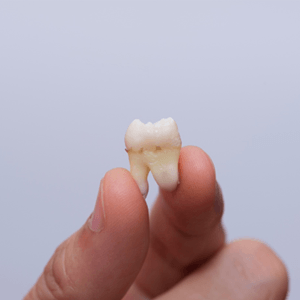
Tooth Extractions – Westborough, MA
Gentle Tooth Extractions

Here at All Dental, we understand tooth extractions can sometimes be stressful but necessary procedures for your oral health. Our experienced and empathetic staff ensures that, with tooth extractions in our Westborough, MA dental office, you feel comfortable and at ease, so you leave our dental office with a happier and healthier smile.
Why Choose All Dental for Tooth Extractions?
- Sedation Available
- Recommended Only When Truly Necessary
- State-of-the-Art Tooth Replacement Available
Reasons for Tooth Removal

Trauma or excessive decay, baby teeth that did not fall out, excess teeth, wisdom teeth, and gum disease are good reasons for tooth removal. Your local dentist in Westborough will assess your dental health situation and advise you when tooth removal is necessary. Sometimes the risk of infection is reason enough, especially if you are a cancer patient or have gum disease.
Will Tooth Extraction Hurt?

Your local dental clinic will assess your situation and will determine the best pain prevention for you. It could be a local anesthetic injection to numb the area or it could be a general anesthetic where no pain would be felt throughout the body and you would sleep throughout the procedure. Most dentists will ensure that patients are comfortable during the entire procedure.
What Is the Tooth Extraction Procedure?

For an impacted tooth, the dentist will first remove gum and bone tissue that appear on the tooth. Then they will commonly use forceps to rock the tooth back and forth. This loosens the tooth from the jawbone. Hard to pull teeth may have to be broken up and removed in separate pieces.
Tooth Extraction Recovery

When the tooth has been extracted, a blood clot will appear in the tooth socket. Gauze will be placed in the socket and the patient will be asked to bite down to help stop the bleeding. If necessary, the dentist will stitch the affected area. Your local dental office will provide detailed instructions after the extraction. You may experience some discomfort following the procedure but that should diminish within a few days. Call your dentist with any questions or concerns.
Understanding the Cost of Tooth Extractions

There are a number of different factors that can influence the cost of tooth extractions. Generally speaking, it is affordable for most patients. During your appointment, we will help you understand the financial aspect of your care and provide you with a personalized estimate. We can also assist you as you explore payment options, such as financing and insurance. We want the process of paying for your extractions to be as low-stress as possible.
Factors That Can Affect Tooth Extraction Cost

Some of the factors that can influence the cost of tooth extractions include:
- The specific tooth (or teeth) that need to be removed. Some teeth are more challenging to extract than others. Therefore, they incur higher fees. This is often the case with wisdom teeth, particularly if they are impacted (stuck beneath the gumline.)
- The number of teeth being extracted. Logically, extracting several teeth costs more than extracting just one or two.
- The complexity of the case. The team at All Dental in Westborough can handle most extractions right here in our office. However, if your case has certain complicating factors, we may refer you to a specialist who has a different pricing structure than our own.
- Additional care. Sedation during your procedure, as well as tooth replacement afterward, can add significantly to the total cost of your dental treatment.
Does Dental Insurance Cover Tooth Extractions?

Yes, it is common for insurance to cover tooth extractions. Simple extractions are often categorized as a minor procedure, meaning that up to 80% of their cost may be covered. Surgical extractions may be designated as a major service, so only 50% of their cost might be covered. Of course, insurance policies vary greatly, so you will have to dig into the details of your unique benefits to see how they apply. Our team would be happy to help you navigate your policy and use it in the most advantageous way.
Other Options for Making Tooth Extractions Affordable

Here are a few provisions beyond insurance that might make it easier for you to afford your tooth extractions:
- The Essential Dental Plan. This discount plan is designed specifically for patients without insurance. In exchange for a reasonable fee, it provides reduced fees on virtually all the services available in our office.
- We are happy to accept CareCredit, a third-party company that provides low-interest payment plans for medical and dental services. You may be able to choose a monthly installment amount that works well for your budget.
Do not let the financial side of tooth extractions hold you back from getting necessary care! Our team is ready to help you explore your options and enjoy a low-stress treatment experience.
Tooth Extraction FAQs

If you believe you need to have a tooth removed, the team at All Dental in Westborough is ready to serve you. Before you move forward with treatment, however, you may want to know more about the path in front of you. To help you out, we have put together the following list of answers to some FAQs about extractions. If your specific questions are not addressed here, contact us directly. We look forward to talking with you.
Is There an Alternative to a Tooth Extraction?
We understand that many patients are reluctant to get a tooth extracted. They do not want a gap in their smile, and they do not want to pay for tooth replacement.
If you wish to prevent an extraction, it is imperative that you take care of your teeth and seek dental care as soon as you suspect that there is a problem. For example, we can usually address gum disease and decay with conservative treatments if they are caught early on. If treatment is delayed for too long, though, an extraction may be the only reasonable option.
If we recommend that one of your teeth gets removed, we have already considered alternatives and determined that an extraction is in the best interests of your long-term oral health.
What Is the Difference Between Tooth Extractions and Wisdom Tooth Surgery?
Basically, wisdom tooth surgery is a type of tooth extraction. It is exclusively for the wisdom teeth, the third molars at the back of the mouth. Removing them can be somewhat complicated, particularly if they are impacted (stuck beneath the gumline). We might have to make incisions in the gums or break the teeth into pieces.
Regular tooth extractions are usually more straightforward. We simply lift the tooth out of its socket, grip it with forceps, and use gentle force to remove it.
What Are My Options for Replacing a Missing Tooth?
There are basically three ways to replacing missing teeth:
- Dental implants act as prosthetic tooth roots. They work along with high-quality crowns, bridges, or dentures. We often recommend them as the most beneficial and longest-lasting form of tooth replacement.
- A fixed bridge can replace a few missing teeth in a row. It relies on the nearby natural teeth for support and can be a reliable, natural-looking way to recomplete a patient’s smile.
- Dentures are removable prosthetics that can replace a few teeth or an entire arch of teeth. They usually have a relatively low upfront cost.
Your dentist will talk to you about the pros and cons of each of your tooth replacement options so you can make a well-informed decision.
Can I Leave the Space Empty After a Tooth Extraction?
If you get a wisdom tooth or extra tooth extracted, then yes, it should be fine for you not to get it replaced. In most other circumstances, however, we strongly urge our patients to get an implant, bridge, or denture.
Leaving the space empty after an extraction can lead to a number of complications. For example, your jawbone will start to deteriorate, and your remaining teeth may drift out of place. You may also feel self-conscious about your smile and be at a heightened risk of future tooth loss. A dental implant can prevent all such issues.